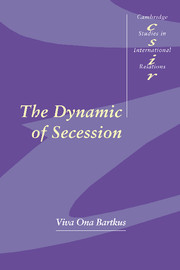5 - The costs of membership
Published online by Cambridge University Press: 22 September 2009
Summary
This chapter begins to explore that side of our allegorical scales which provides the motivations and frequently the justification for secession: the costs of membership and the benefits of secession. The potential costs of integration into a larger heterogeneous state constitute the logical counterweight to the benefits of membership examined in Chapter 3. This chapter utilizes multiple cases to investigate the two broad categories of such potential disadvantages: first, physical hard-ships such as hunger, dispossession, and even mortal threats, and second, cultural threats. One can but recoil from instances where the government mobilizes its resources to force deportation or cultural assimilation onto one group of its citizens. Although still possible, such gross abuses are less likely when governments are in some way directly accountable to those they govern. None the less, it is the persecuted community that bears the costs when governments sacrifice the preservation of human life and unique culture to pursue other priorities.
It is perhaps useful to restate the sense in which I used the terms “costs” and “benefits” in this analytical framework. At a fundamental level, “costs” are abstracted from their normal usage implying financial loss and revolve around the notion of a penalty, such as the loss of life or livelihood or opportunity. The investigation of instances of injustice or dispossession or even murder is by its very nature a value-laden exercise, and thus,fits only awkwardly into a cost/benefit approach to the subject of secession.
- Type
- Chapter
- Information
- The Dynamic of Secession , pp. 79 - 95Publisher: Cambridge University PressPrint publication year: 1999



